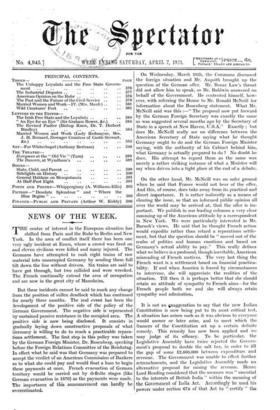On the other hand, Mr. McNeill was on safer ground
when he said that France would not hear of the offer. And this, of course, does take away from its practical and direct importance. It is rather indirectly as a means of clearing the issue, so that an informed public opinion all over the world may be arrived at, that the offer is im- portant. We publish in our leading columns a very clear summing up of the American attitude by a correspondent in New York. We were particularly interested in Mr. Baruch's views. He said that he thought French action would expedite rather than retard a reparations settle- ment, but that the question should be "moved out of the realm of politics and human emotions and based on Germany's actual ability to pay." This really defines what we believe is a profound, though inevitable, American misreading of French motives. The very last thing the French want is a settlement based on financial practica- bility. If and when America is forced by circumstances to intervene, she will appreciate the realities of the situation. Till then it is perhaps better that she should retain an attitude of sympathy to French aims—for the French people both we and she will always retain sympathy and admiration.










































